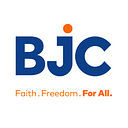Public school teachers: Vanguard defenders of religious freedom
By Rev. Jennifer Hawks, BJC Associate General Counsel
Early in my public school education, I learned there were three branches of government, but it was my U.S. government teacher, Mrs. Ruth Dunning, who made sure I understood how government works. She properly sensed that the class full of honors students had not really grasped why civics class should be a required course. In the tradition of all great teachers, she transformed “government” from a nebulous concept to something immediately relevant. No easy task for a petite woman standing before 20 know-it-all seniors!
She asked us to describe the government and wouldn’t settle for simply naming the three branches — legislative, executive and judicial. “Who are the three branches?” she demanded. We quickly called out the obvious answers: president, Congress and Supreme Court. She wrote them on the chalkboard but then asked, “Who else?” So, we named the state and local office titles: governor, mayor, legislature, city council and court system. “Yes,” she replied, “and who else?” We eventually filled the board with other entities, but she kept asking, “who else?”
You see, there was one government entity we were all very closely connected to but had overlooked. It’s probably the first government entity most of us knowingly interact with — public schools. She wanted to make sure that we understood that she was “the government” in our public school classroom. Education is one of the most important functions for state and local governments, and public school personnel are their official representatives.
Like other governmental entities, the public schools must follow the Constitution. Public school teachers and administrators protect students’ constitutional rights, including religious freedom. In doing so they prepare students to thrive within the diversity of our communities. Public school teachers are therefore not only the frontline examples of government at work in the lives of its citizens but also the defenders of religious freedom for 90% of U.S. schoolchildren.
Public schools are often a microcosm of larger societal debates. The intersection of public education and religion is no exception. Who should teach a child what it means to be a person of faith or how to engage in religious practices? The resounding answer has always been parents, houses of worship, clergy and others; never the government.
Since the 1960s school prayer cases, the U.S. Supreme Court has been clear that public schools must protect students’ voluntary religious expression and cannot force religion on students by telling them when, where or how to pray.
In the 1980s, Congress entered the debate and passed the Equal Access Act, which ensures that students have the right to form a religious club if the school permits any clubs not directly tied to courses taught at the school. For example, if the school has a chess club, then students wishing to gather to explore Christianity, Hinduism, Islam, Judaism, Native American spirituality or any other religious tradition must be allowed to do so on an equal basis with the chess club. To ensure these gatherings are voluntary, student-led and student-initiated, the law requires that school personnel in attendance do not participate in the religious activity.
Since the 1990s, Democratic and Republican administrations have released guidance on religious expression in public schools. This guidance always contains some limitations on teachers’ personal religious expression to ensure that students’ rights are protected. The most recent presidential guidance is the January 2020 guidance released by the Trump administration, which includes:
When acting in their official capacities as representatives of the State, teachers, school administrators, and other school employees are prohibited by the First Amendment from encouraging or discouraging prayer, and from actively participating in such activity with students.
This makes sense. While on duty, public school teachers are the government. Their actions can protect or subvert the religious freedom of students. I am grateful every day for our public school teachers and administrators who step up to the challenge of defending constitutional rights, especially religious freedom, for our students and communities.
In a few weeks, BJC will be filing a brief that continues in this long, uncontroversial tradition of protecting the religious freedom of public school students. The U.S. Supreme Court will be hearing arguments in Kennedy v. Bremerton School District, a case brought by a coach who claims the unprecedented right to pray with students while in his official capacity. For some background on the case, check out the latest news section on BJC’s website and stay tuned for our analysis of the case and what’s at stake for faith freedom for all.
